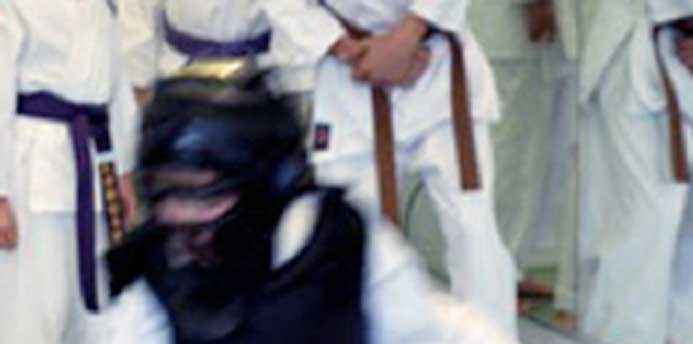Of the 28 kids who took the karate promotion exam at the Traditional Karate Center in Wilmette last spring, 27 got promoted to a full belt. Only one kid got a provisional pass: my youngest son, Billy.
Billy, who I’m always feeling bad for because he has grown up in the back of our minivan, eating meals from vending machines and getting dragged to his older brother’s games, stood in the packed Dojo, tears spilling from his big brown eyes, vowing to quit karate forever.
At that moment, I wanted nothing more than to tell Sensei Scott, the head instructor and Traditional Karate Center director, that a grown man shouldn’t wear his pajamas in public (or his gi, or whatever it’s called), that karate is for kids who can’t play ball sports and my Billy is far too cool for his crappy Dojo.
Thankfully, it didn’t go down that way. My older boys play for the Trevian Soccer Club, and like countless other youth sports organizations, the Trevians request that parents wait 24 hours after a game or a triggering event to contact the coach or the club. For hot heads like me, this cooling off period really helps.
The next day, I was able to have a rational discussion with the Sensei. Billy got his full yellow belt a week later, and it proved to be one of those life-lessony type experiences for both of us. He didn’t quit karate after his first setback, and I don’t have a restraining order keeping me 500 feet from the Dojo.
In addition to promoting cooler heads, the 24-hour rule protects the players from witnessing possible confrontations between parents and coaches. Eddie Amaral, director of soccer for the Trevians, encourages parents to voice their concerns, but he prefers to address the problems without the kids around.
Rich Blakey, development director for Northbrook Bluehawks Hockey,
knows how to exit any area rinks via the backdoor, just so he can avoid post-game discussions in the lobby.
“While most parents are levelheaded, it’s never great to talk right after a game,” Blakey says. “You don’t know who got fired today or whose kid is being picked on at school.”
Like Amaral, Blakey values parents’ opinions and keeps an open line of communication. He holds three to four meetings a year to discuss any concerns, including the touchy subject of ice time. But immediately following a game, Blakey wants to focus on his team. Only players and coaches are allowed in the locker room.
So, while offering up parenting advice of any kind gives me the willies (I mean, who am I to tell anyone what to do? My many infractions include leaving my baby strapped in his car seat on a bar and losing my kids on purpose at Costco), but the 24-hour rule really does make sense.
Oh, and karate parents, please don’t send little Jimmy over to put a hurt on me with his Ninja moves. My rational self knows your kids are tremendous athletes, and they could kick my hockey-playing butt.

